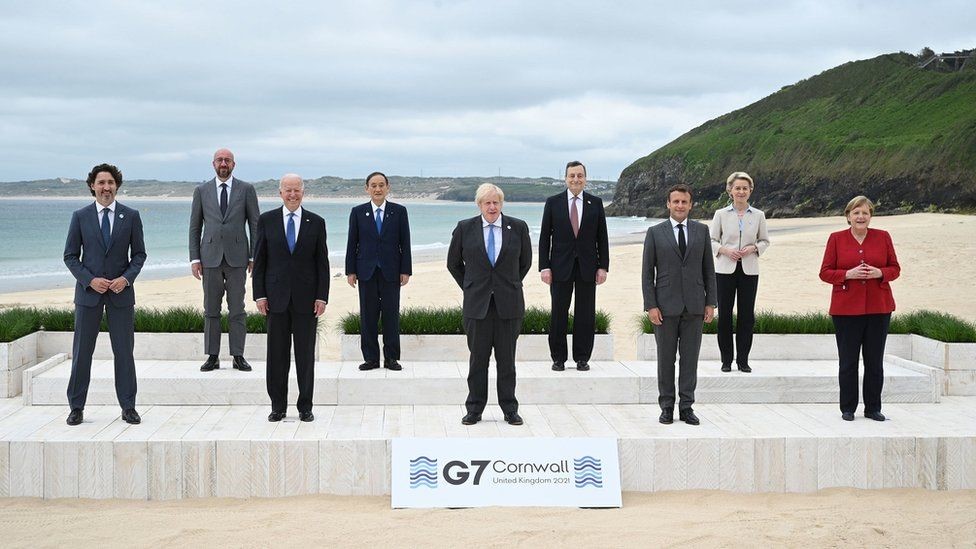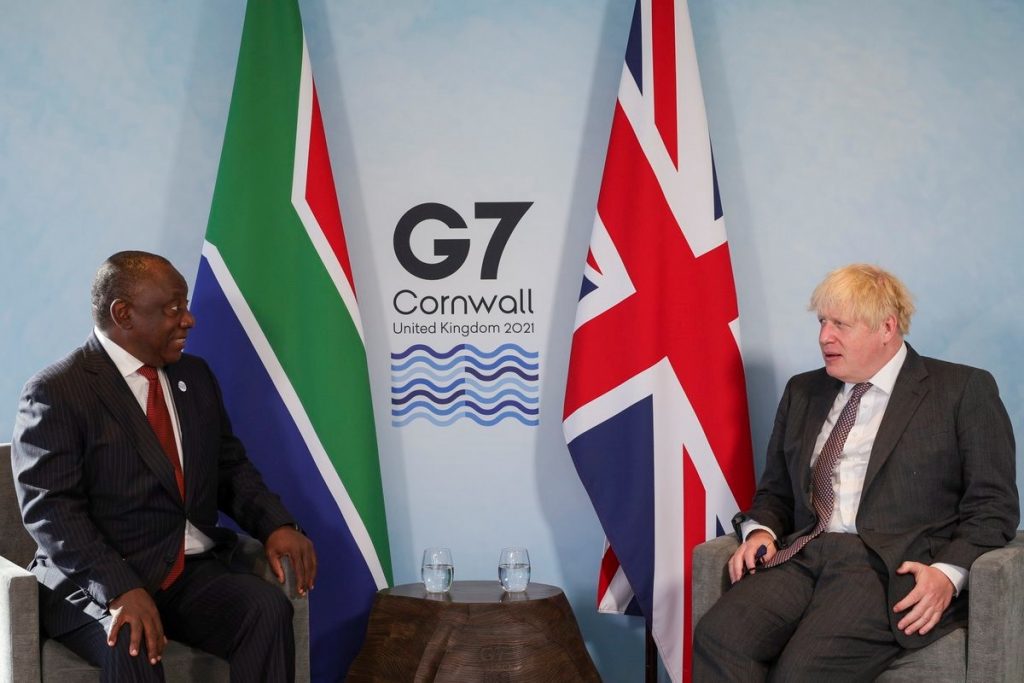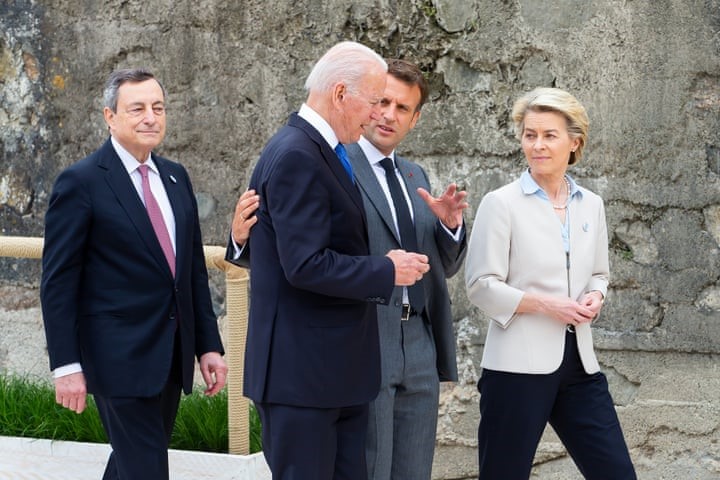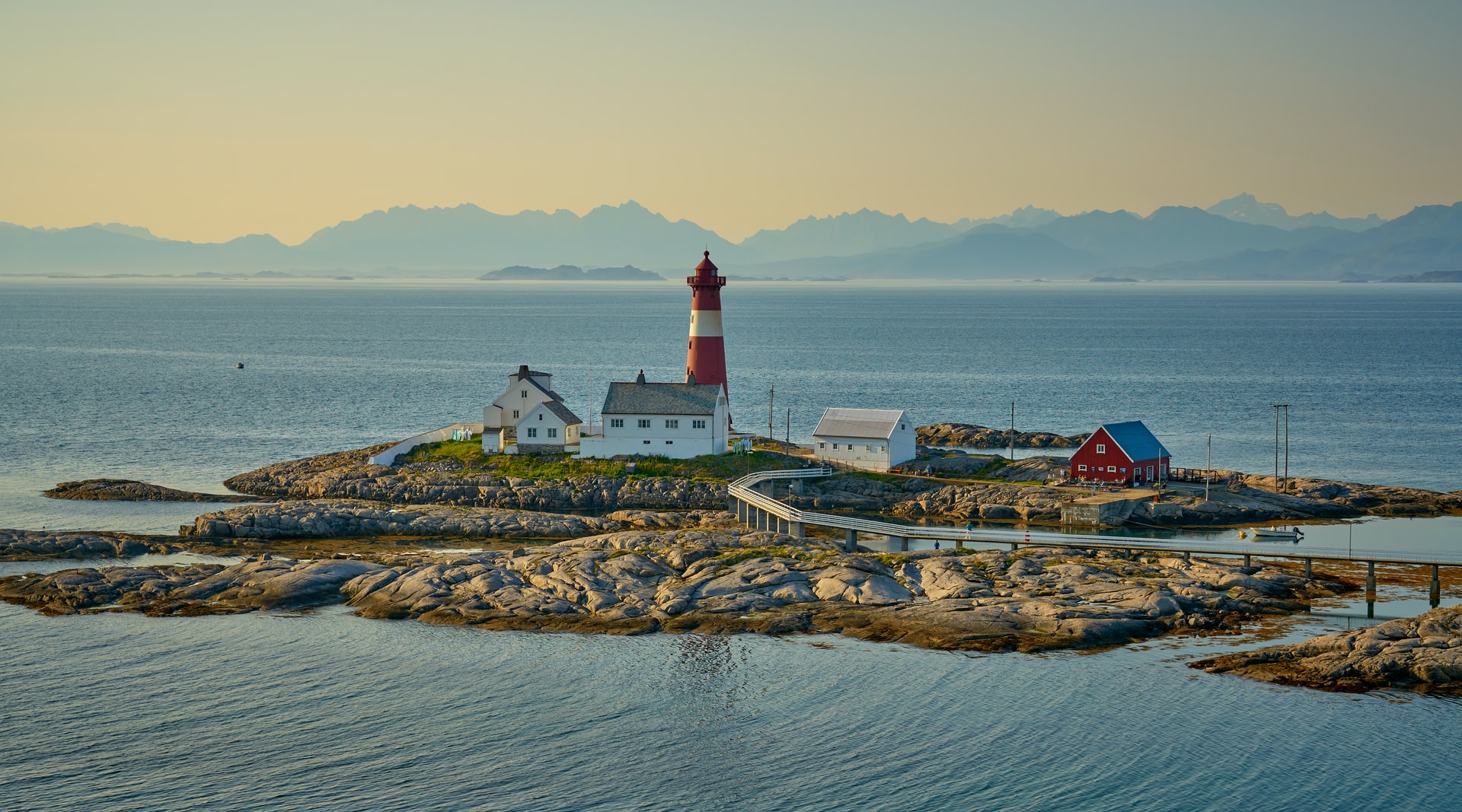The annual Group of Seven (G7) Summit was held in Cornwall from 11-13 June 2021, marking the first in-person meeting of prominent Western leaders and invited guests under British presidency and since the COVID-19 pandemic spread globally in March 2020. Aaliyah Vayez, student of MSc International Relations at LSE, 2020/21, examines the G7 states’ disappointing response to vaccine inequity.
 G7 leaders at G7 summit in Carbis Bay, Cornwall, Britain, June 2021
G7 leaders at G7 summit in Carbis Bay, Cornwall, Britain, June 2021
Photo credit: Leon Neal/PA Media
The Summit promised to be an opportunity for leaders of the most industrialised countries to formulate collective responses to several widespread challenges – notably including the coronavirus pandemic and climate change. Leaders would further be prompted to consider the future of the G7 and its contribution to the wider system of global governance going forward. Taken together, observers across the world watched as G7 leaders were to strike a pragmatic balance between addressing the pressing challenges of the present and the looming prospects of the future.
Amongst agenda items concerning upscaling the donation of surplus vaccines and increasing countries’ capacity to manufacture and distribute vaccines and other medical necessities, the G7 announced plans to donate 1 billion COVID-19 vaccines to the world’s poorest and developing countries, with sizeable donations coming from the United States, United Kingdom and Canada.
Additionally, G7 leaders were presented with a comprehensive plan prepared by the Access to COVID-19 Tools (ACT) Accelerator for vaccine delivery through COVAX, a unique burden-sharing formula proposed by South Africa (in attendance) and Norway. This plan includes G7 countries paying two-thirds of the nearly $70 billion cost needed for implementation. Instead, the G7 Summit saw leaders commit to offering up $7.5 billion to vaccine rollout programs in poor countries.
Western leaders have failed to grasp both the enormity of the impact of COVID-19 on developing nations and the exceptional efforts needed to overcome the virus and its effects.
While these efforts may be considered a step in the right direction of acknowledging the pressing need for vaccinations across the world, Western leaders have failed to grasp both the enormity of the impact of COVID-19 on developing nations and the exceptional efforts needed to overcome the virus and its effects. The Head of the United Nations, Antonio Guterres, who argued that the world was simply in need of much more – more doses, more urgency, and a fundamentally global vaccination plan because “…in an interconnected world, none of us is safe until all of us are safe”.

Britain’s Prime Minister Boris Johnson and South Africa’s President Cyril Ramaphosa attend a bilateral meeting during G7 summit in Carbis Bay, Cornwall, Britain, June 13, 2021.
Photo Credit: Stefan Rousseau/Pool via REUTERS
To date, COVID-19 testing, treatments, and vaccines have not been equitably distributed across developed and developing countries. Rather, high-income countries have and maintain the ability to vaccinate their entire population, while low-income countries continue to account for less than one per cent of doses administered worldwide.
Such stark criticism points to the lack of tangible progress made on the demand from around 100 developing nations for a temporary waiver of the Trade-Related Intellectual Property Rights (TRIPS) Agreement, with respect to pharmaceutical products and vaccine technology, under the World Trade Organisation (WTO). Only recently has the US expressed support for the TRIPS waiver, however, the details of this support have not been finalised nor serve as cause for optimism as the waiver is still being blocked by powerful countries, like Germany, Japan, and the United Kingdom, which have had preferential access to vaccines. Rather, these countries have deemed the TRIPS waiver an “extreme measure” and are backed up by the profit-driven interests of pharmaceutical giants.
While this is evident of the broader collapse of global solidarity in the fight against the pandemic, it further alludes to what has been dubbed “vaccine apartheid”. Vaccine apartheid concerns the inequitable access and distribution of vaccines across the world driven by industrialised countries in the Global North. This has been fuelled by and in turn reinforces vaccine nationalism, evidenced by countries, such as Canada and the US, hoarding vaccine supplies to the extent that they are able to vaccinate their populations multiple times over in turn, proving their ability to alleviate countries in need with little cost to themselves. These actions by wealthy and predominantly Western states separates them from the rest of the world, dually framing their indifference as a victory over the coronavirus and the solidarity of other countries as ill-preparedness or weakness in the face of crises.
These actions by wealthy and predominantly Western states separates them from the rest of the world
While some countries, like New Zealand, have expressed their commitment to share surplus vaccinations with neighbouring or developing countries, the developing world cannot hope to survive the pandemic by relying on the benevolence of the wealthy. As the coronavirus has demonstrated its non-discriminate behaviour across the world, the predatory capitalist market system and the intellectual property rights framework which protects it place low-income and developing countries in a highly unfavourable position when managing the ongoing impact and consequences of the pandemic.

President Joe Biden walks with France’s President Emmanuel Macron at G7 summit in Carbis Bay, Cornwall, Britain, June 11, 2021. Photo credit: Jonny Weeks/Pool via REUTERS
One need only to refer to the rising death tolls, minute percentage of vaccinations and collapsed healthcare infrastructure across the developing world to evidence what the Director General of the World Health Organisation (WHO) referred to as a “catastrophic moral failure.” A failure which has exposed both the historically inferior position of developing countries in institutions of global governance and, the precarious nature of multilateralism and global solidarity on which the present liberal world order currently operates.
A failure which has exposed both the historically inferior position of developing countries in institutions of global governance and the precarious nature of multilateralism and global solidarity
Additionally, the TRIPS waiver must be recognised as a means to an end, a first step to effectively managing the ongoing pandemic and its long-term consequences. Additional measures including upscaling global manufacturing capacity technology and skills transfers between developed and developing countries must be considered just as vital to realising better global management of the pandemic.
Arguably, the solution to the ongoing pandemic lies in the ability of world leaders to recognise its global nature. In doing so, the pandemic may be recognised as a fundamental threat to all of humanity. This purports the need to suspend any legal limitation or resource constraint to formulating a collective response that enables equitable access and distribution of vaccines to all. COVAX, the nearest embodiment of such a collective response, must be treated as a mechanism for global security that is able to ensure social and economic welfare, balanced rights and obligations, as well as the mutual advantage of producers and users of technological knowledge and innovation.
A virtuous circle can be constructed towards ensuring quality healthcare and access thereto is considered a universal human right – one that both transcends national and subnational boundaries
Through this, a virtuous circle can be constructed towards ensuring quality healthcare and access thereto is considered a universal human right – one that both transcends national and subnational boundaries as well as does not rely on the efforts of international institutions or country groupings, like the G7. In this case, faith in the value of a liberal order underscored by multilateralism and systemic cooperation may not be in vain and the world may avoid future epidemics, increasingly de-globalised clusters of states and disillusioned publics.
While the upcoming G20 Summit in October 2021 will provide a platform for a more diverse range of countries to have their say in the global management of COVID-19, one hopes this will not be yet another lost opportunity for multilateralism and necessary crisis management that much of the world depends on.
This article represents the views of the author, and not the position of the Department of International Relations, nor of the London School of Economics.





